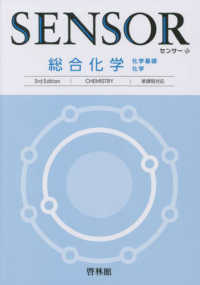- ホーム
- > 洋書
- > 英文書
- > Philosophy
Full Description
François Jullien, the leading philosopher and specialist in Chinese thought, has always aimed at building on inter-cultural relations between China and the West. In this new book he focuses on the following questions: Do universal values exist? Is dialogue between cultures possible?
To answer these questions, he retraces the history of the concept of the universal from its invention as an aspect of Roman citizenship, through its neutralization in the Christian idea of salvation, to its present day manifestations. This raises the question of whether the search for the universal is a uniquely Western preoccupation: do other cultures, like China, even have a notion of the universal, and if so, how does it differ from ours? Having considered the meaning of the concept in the East and West, Jullien argues that, if communication between cultures is to be meaningful, facile assumptions of universal values and complacent relativism need to be examined. It follows, therefore, that dialogue between cultures should not begin with issues of identity and difference, but rather by considering divergence and profusion. By no longer simply assuming universality, we allow for greater self-reflection.
This wide-ranging and engaging study will be of particular interest to students and scholars of philosophy and of Chinese culture and society. It will also appeal to a wider readership interested in contemporary thought and the challenges of communication between East and West.
Contents
Foreword
Itinerary
I. On the Universal
II. On the Uniform
III. On the Common
IV. From the advent of the State to the cosmo-political extension of the common
V. The other level: the universal as a logical category
of philosophy
VI. First encounter of the universal and the common:
Roman citizenship extended to the Empire
VII. Paul and the matter of going beyond all communitarianism in Christian universalism
VIII. Does the question of the universal arise in other cultures?
IX. Are there universal notions? A cultural universal having ideal status
X. On Human rights - the notion of universalising
XI. If it is neither synthesis nor denominator nor foundation, from where does the common arise?
XII. On 'Cultures': divergences of language - the resources of thought
XIII. To construct the dialogue between cultures to counter the surrounding uniformisation; human self-reflection








